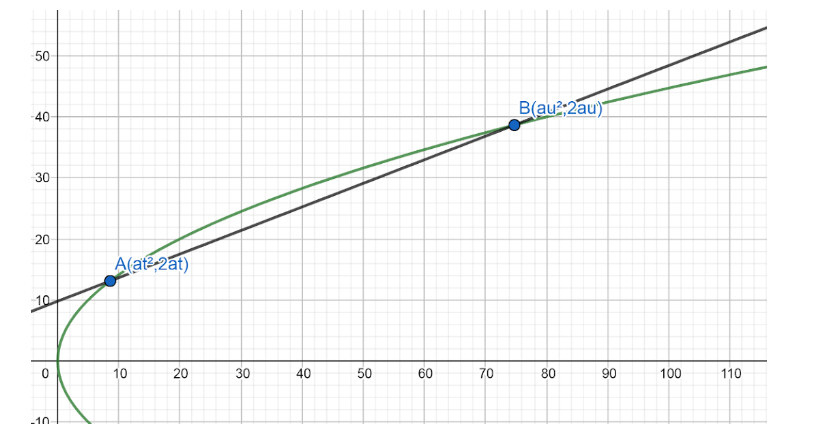Question
Question: Find the locus of the middle points of chords of the parabola which are of given length \[l\]....
Find the locus of the middle points of chords of the parabola which are of given length l.
Solution
Hint: Use distance formula for finding distance between two general points of the parabola.
Complete step-by-step answer:

Consider the above picture. A(at2,2at) and B(au2,2au)are two variable points on the standard parabola y2=4ax with parameters t and u respectively.
We have been given that AB is constant i.e. equal to l.
We can write distance AB using distance formula which is,
Distance between two points = (x1−x2)2−(y1−y2)2
So,
l=(at2−au2)2−(2at−2au)2
Squaring both sides we get,
{{l}^{2}}={{a}^{2}}\left\\{ {{\left( t-u \right)}^{2}}{{\left( t+u \right)}^{2}} \right\\}-4{{a}^{2}}{{\left( t-u \right)}^{2}}...(i)
Now let point (h,k) lie on our locus. Since they lie on the locus it is the midpoint of our variable chord AB.
Using mid-point formula we can write
Xmid=2x1+x2
ymid= 2y1+y2
We write,
h=\left\\{ \dfrac{\left( x~coordinate~of~A \right)+\left( x~coordinate~of~B \right)}{2} \right\\}
k=\left\\{ \dfrac{\left( y~coordinate~of~A \right)+\left( y~coordinate~of~B \right)}{2} \right\\}
And,
h=\left\\{ \dfrac{\left( \text{a}{{\text{t}}^{2}} \right)+\left( a{{u}^{2}} \right)}{2} \right\\}
2h=(at2)+(au2)
\dfrac{2h}{a}=\left\\{ {{\text{t}}^{2}}+{{u}^{2}} \right\\}...(ii)
k=\left\\{ \dfrac{\left( 2at \right)+\left( 2au \right)}{2} \right\\}
k=(at)+(au)
\dfrac{k}{a}=\left\\{ t+u \right\\}...(iii)
So our next task in finding the locus is eliminating the variables from the above equations.
Squaring equation(iii)and subtracting it from (ii) i.e. (iii)2−(ii)
Which gives,
{{\left( \dfrac{k}{a} \right)}^{2}}-\dfrac{2h}{a}={{\left( t+u \right)}^{2}}-\left\\{ {{\text{t}}^{2}}+{{u}^{2}} \right\\}
{{\left( \dfrac{k}{a} \right)}^{2}}-\dfrac{2h}{a}=\left( {{t}^{2}}+{{u}^{2}}+2ut \right)-\left\\{ {{\text{t}}^{2}}+{{u}^{2}} \right\\}
(ak)2−a2h=2ut...(iv)
Squaring equation(iii)and subtracting it from 2×(iv) i.e. (iii)2−2(iv)
Which gives,
{{\left\\{ \dfrac{k}{a} \right\\}}^{2}}-2\left\\{ {{\left( \dfrac{k}{a} \right)}^{2}}-\dfrac{2h}{a} \right\\}={{\left( t+u \right)}^{2}}-2\left( 2ut \right)
(ak)2−2(ak)2+2a2h=(t2+u2+2ut)−4ut
−(ak)2+a4h=(t2+u2−2ut)
a4h−(ak)2=(u−t)2
a4h−(ak)2=u−t...(v)
Substituting equations (iii)and (v) in (i) we get,
{{l}^{2}}={{a}^{2}}\left\\{ \left( \dfrac{4h}{a}-\left( \dfrac{{{k}^{2}}}{{{a}^{2}}} \right) \right)\left( \dfrac{{{k}^{2}}}{{{a}^{2}}} \right) \right\\}-4{{a}^{2}}\left( \dfrac{4h}{a}-\left( \dfrac{{{k}^{2}}}{{{a}^{2}}} \right) \right)
{{l}^{2}}=\left\\{ \left( \dfrac{4h}{a}-\left( \dfrac{{{k}^{2}}}{{{a}^{2}}} \right) \right){{k}^{2}} \right\\}-4\left( 4ah-{{k}^{2}} \right)
l2=(a4hk2−(a2k4))−16ah+4k2
l2=a4hk2−a2k4−16ah+4k2
Now since (h,k)are general points on our locus we can replace h by x and k by y.
l2=a4xy2−a2y4−16ax+4y2
This is the required locus.
Note: Students have to think carefully while deciding which is the variable before eliminating. In this question students might eliminate a which will give them the wrong answer. Also they may use their different techniques to eliminate the variable from the equations. Also, if they feel it is redundant to use (h,k)first and then replace it as (x,y) they may use (x,y)from the start as well.
